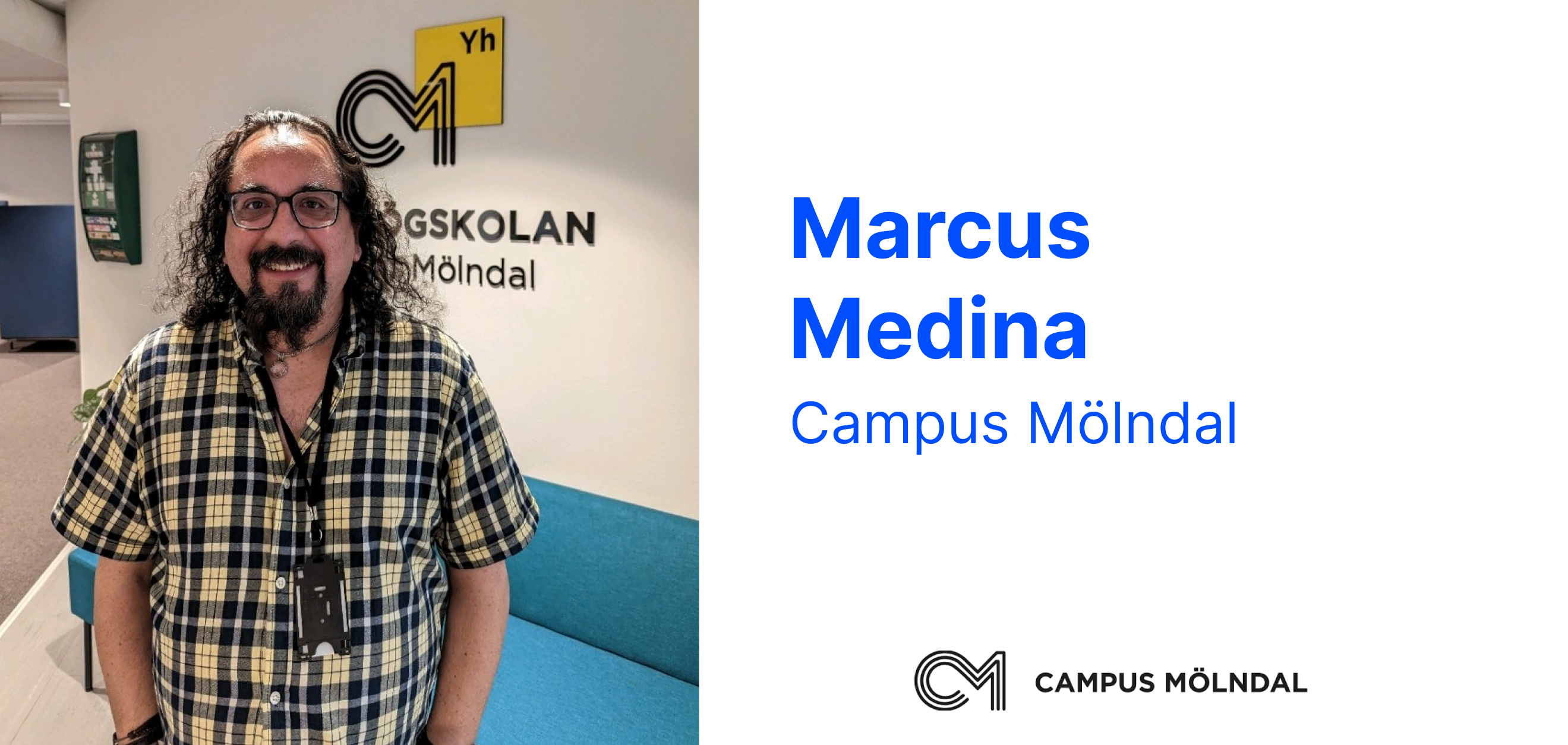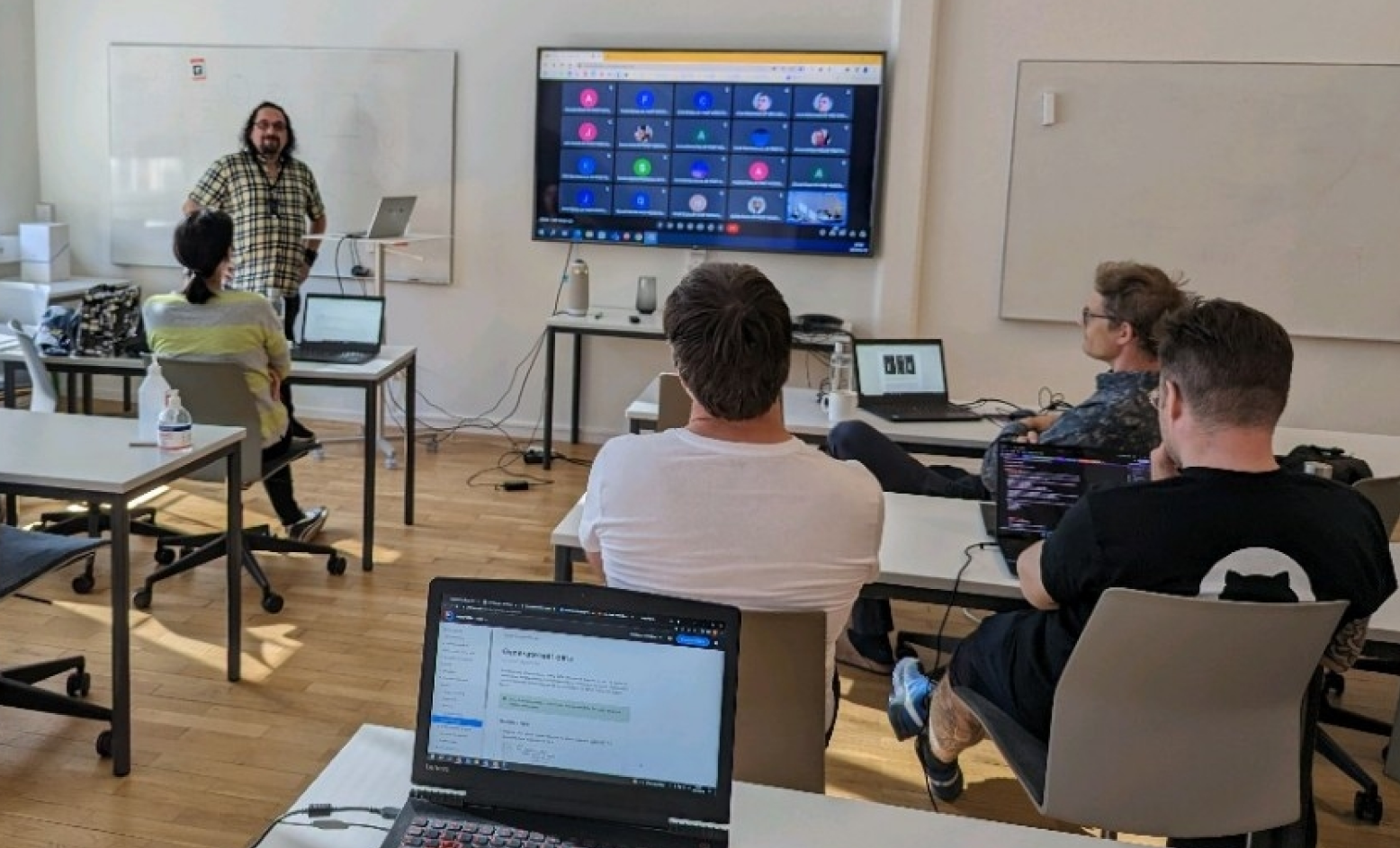Behind the Books: Marcus Medina Inspiring the Next Generation of Programmers at Campus Mölndal

Programming has become an essential skill in a rapidly changing digital world, and teachers who can effectively impart this knowledge are highly sought after. One such teacher is Marcus Medina, a programming teacher at Campus Mölndal. Marcus's passion for teaching and dedication towards students has made him a respected figure in programming education. We at CodeEasy got an opportunity to interview Marcus.
Join us as we unravel his journey as a teacher, his approach to teaching programming to beginners, and his insights into the future of programming education.
What inspired you to become a programming teacher at Campus Mondal in Sweden?
It was the friendly and welcoming atmosphere among the staff at Campus Mölndal that really inspired me to become a programming teacher there. Working with such nice and supportive colleagues is absolutely wonderful. One thing that impressed me was the strong bond between staff and students and it influenced my decision to join Campus Mölndal. From the beginning I was employed as a consultant, but some time ago I switched to full-time employment, which further strengthened my commitment to Campus Mölndal.
What do you think are the key skills needed for a programming teacher to be successful?
It is important to have a pedagogical streak, as it enables effective teaching methods. Then there are several important skills that I believe contribute to the success of a programming teacher. Firstly, it is important to have a well-structured method, something that I am constantly trying to improve myself. Creativity also plays a critical role in adapting lessons and assignments to meet the unique needs of each class. Experience of the profession is essential to have a solid understanding of the subjects being taught, while in-depth knowledge enables a comprehensive understanding of the material. With my experience as a consultant, I approach my students as juniors and work closely with them, providing guidance and support just as I would with junior consultants. Passion for programming is a driving force that brings satisfaction when I help others with their code. In addition, experience in reviewing code allows one to efficiently detect errors without the need for extensive compilation, saving valuable time. Finally, humility is important, as it encourages students to explore their own coding styles and realize that my way is not the only correct approach, something I often point out.
How do you approach teaching programming to students with little to no prior experience in the subject?
When teaching programming to students who have little or no prior experience in the subject, my approach is to focus on making the learning process fun. I start by avoiding complicated technical jargon and instead give simple explanations that are easy to understand. As the lessons progress, I gradually introduce more technical concepts in an exciting way and supplement them with tasks that require students to apply the latest topics we've covered. Throughout the trip, I provide plenty of encouragement to create a safe and fun learning environment. Many newcomers can be insecure about working with computers, but by making the learning experience fun, most of these fears can be alleviated. I also address the challenge of a lack of programming experience by offering simple and engaging tasks that relate to the students' own lives. For example, we can generate values and text with their name, age or date of birth, or explore data related to their interests such as sports or hobbies. By connecting programming to their personal experiences, it helps spark their interest and motivation.

What advice would you give to someone interested in learning programming, but is hesitant to start?
I would really recommend anyone who is interested in learning programming but feels hesitant to take the first step and try it out. Learning programming is like learning a new language. In the beginning, you need to understand the basic structure, which may seem a bit boring. But once you've got a solid foundation, you'll open up the exciting world of programming where you can start playing and experimenting with the language. The entire educational journey can span two years, and it may sound like a big commitment, but I assure you the time will fly by. Moreover, in those two years you will not only have gained valuable programming skills, but you will also have increased your career prospects and opened up a wealth of new opportunities. Remember, time will pass regardless, so why not make the most of it by embarking on this rewarding learning journey that could change your future?
How do you stay up-to-date with the latest developments and advancements in the field of programming, and how do you incorporate them into your teaching?
I am aware that I may be a little old-fashioned, but to stay up-to-date I subscribe to newsletters from companies that develop products in my field of interest, such as Microsoft's Visual Studio, JetBrains and other similar companies. In addition, I follow companies and their products on LinkedIn. I also keep up to date by reading news about the latest developments in, among other things, programming languages and artificial intelligence. It gives me ideas of what I can delve into. It's a lot of reading for me, and as I read I think about how best to explain these topics to my students. Sometimes I also take courses on different platforms such as Alison, Udemy and LinkedIn.
Finally, what do you see as the future of programming education and how do you think CodeEasy will play a role in shaping it?
You can learn programming theoretically, but you learn more and better through practice. Combining both in an appealing way is, in my opinion, exactly what is needed to give new programmers a solid foundation. Programming with a backstory, similar to the approach at CodeEasy, is a great way to learn. Future development is gradually moving in that direction - lots of practice, some theory and learning based on stories. It will be both fun and exciting to learn that way. The method of long lectures where knowledge is filled like sausage stuffing is not what a programmer really needs. Certainly the theory is important, as you have to understand what you are doing, but practicing first means that the theory is absorbed better and faster. My big dream has long been to have a program that tells a story that engages the student, and CodeEasy actually does just that. Therefore, I was very happy when I found out that the product existed. From my point of view, that's exactly what the future represents - putting students in scenarios where they get to solve problems through coding. The further the course progresses, the more realistic the scenarios become, so that when the training is completed, they are ready to face the customer's "scenario" and solve the problems that arise. "Learning by doing" - I believe in it.
The CodeEasy team extends its sincere gratitude to Marcus for sharing his invaluable insights and experiences with us in this captivating interview. Marcus's commitment to creating a supportive and engaging learning environment is inspiring. The CodeEasy platform is developed with a similar commitment and passion; CodeEasy is built for maths/proramming teachers where they can keep track of each student's specific needs, but also their students get a personalized and engaging programming education.
